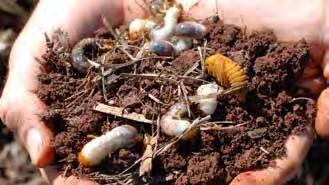
3 minute read
Biological warfare
The discovery of viruses in canegrubs and soldier flies could lead to biological controls for the destructive pests.
Killer pathogens are being investigated as a potential replacement for chemicals in the control of root-feeding sugarcane pests.
University of Queensland insect molecular biologist Dr Kayvan Etebari has been studying the genomics of canegrubs and soldier flies to identify viruses that could infect and attack populations of the insects.
He has discovered several insect-specific viruses that will undergo laboratory testing to assess their potential as biopesticides.
“There are lots of natural enemies in insect populations and we just need to identify these viruses,” Dr Etebari explained. “Genomic sequencing has improved and become cheaper over the years, now allowing us to identify any pathogen inside the canegrub or soldier fly. We need make sure it’s specific to this insect, that it doesn’t kill any other insects or have any impact on humans or the environment. The viruses we found in canegrubs have similarities to some other insect pathogens that we know kills other insects.
That’s why we believe we are on the right track to identify a biological control
The two-year laboratory trials are aimed at determining the efficacy of the viruses in reducing pest populations as well as ensuring the pathogens don’t have a negative impact any other insects, such as bees.
If a virus passes those tests, scientists would then need to determine how a virus could be mass produced and applied in the field.
“We are in the early stages, we would have to decide how we can make large scale production of these viruses in the lab much further down the track, according to the virus itself,” he said.
“We are hoping the virus can be enhanced in the population, so the beetles can transfer it to each other. Sometimes it just reduces the number of eggs, so the density of the canegrubs in the field is significantly reduced.
“Successful biological control of insect pests using viruses has been demonstrated in various agricultural sectors, with several notable examples.
“For the coconut rhinoceros beetles for instance, they just soak the adult male in a solution of the virus and then release the infected male into the environment and they will do the job for us. It depends on the sort of viruses we have at the end of our research. There are lots of possible applications.”
The research could lead to a replacement for imidacloprid. The chemical is currently the sole tool for controlling canegrubs and the Australian Government is reviewing its use following bans in several other countries.
In the case of soldier flies, there is currently no effective control treatment for the root-eating larvae.
Dr Etebari said the scientific approach has an added benefit in that it can also identify plant pathogenic viruses.
“When we do the sequencing if there are any plant viruses in the insect’s body, we can identify those as well,” he said. “The insects eat the plant tissue and pathogens from those plants remain in their gut. It’s not the main aim of the project but it’s a side result. We have a much wider assessment of the environment.”
The project is funded by the Queensland Department of Agriculture and Fisheries and Sugar Research Australia.







